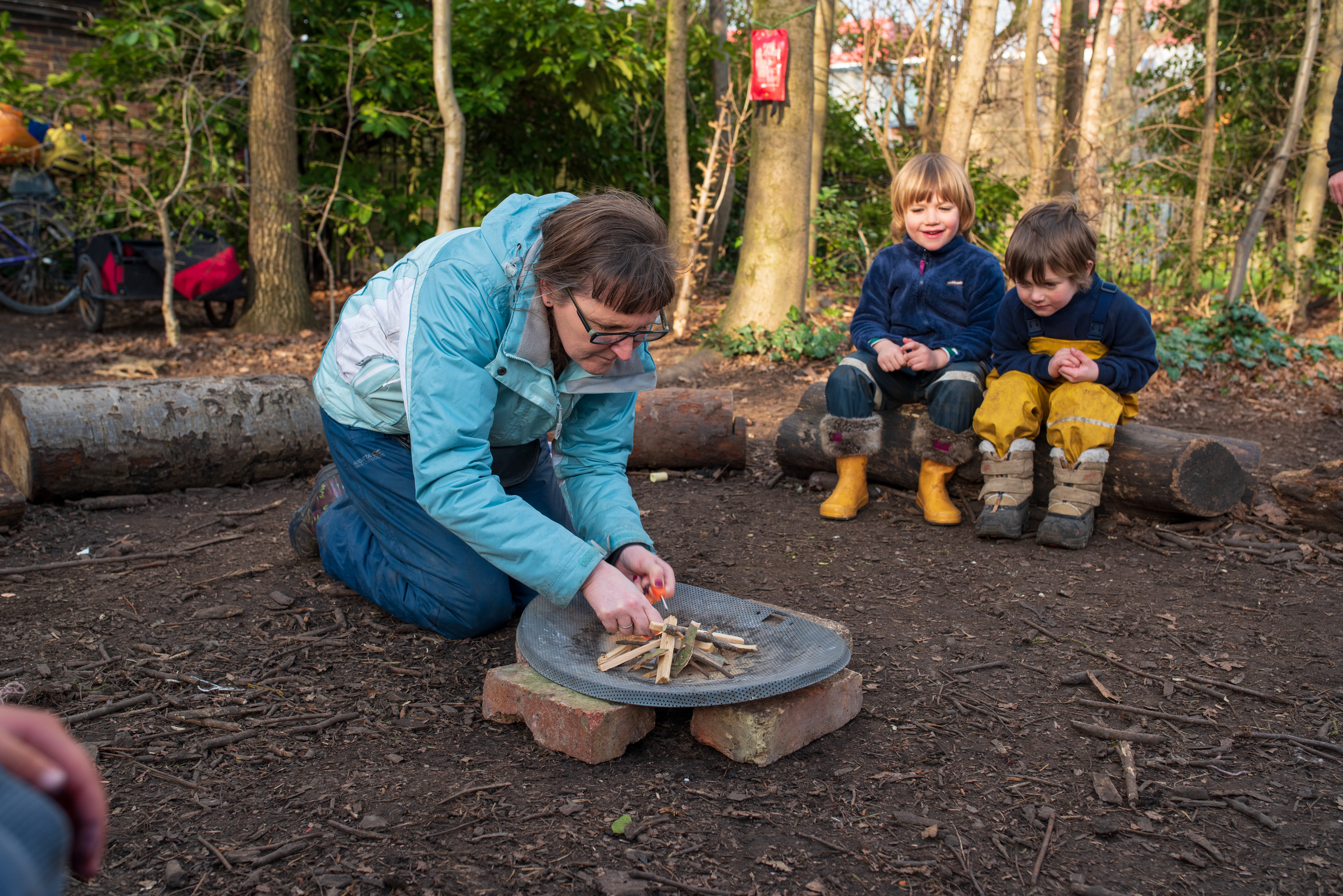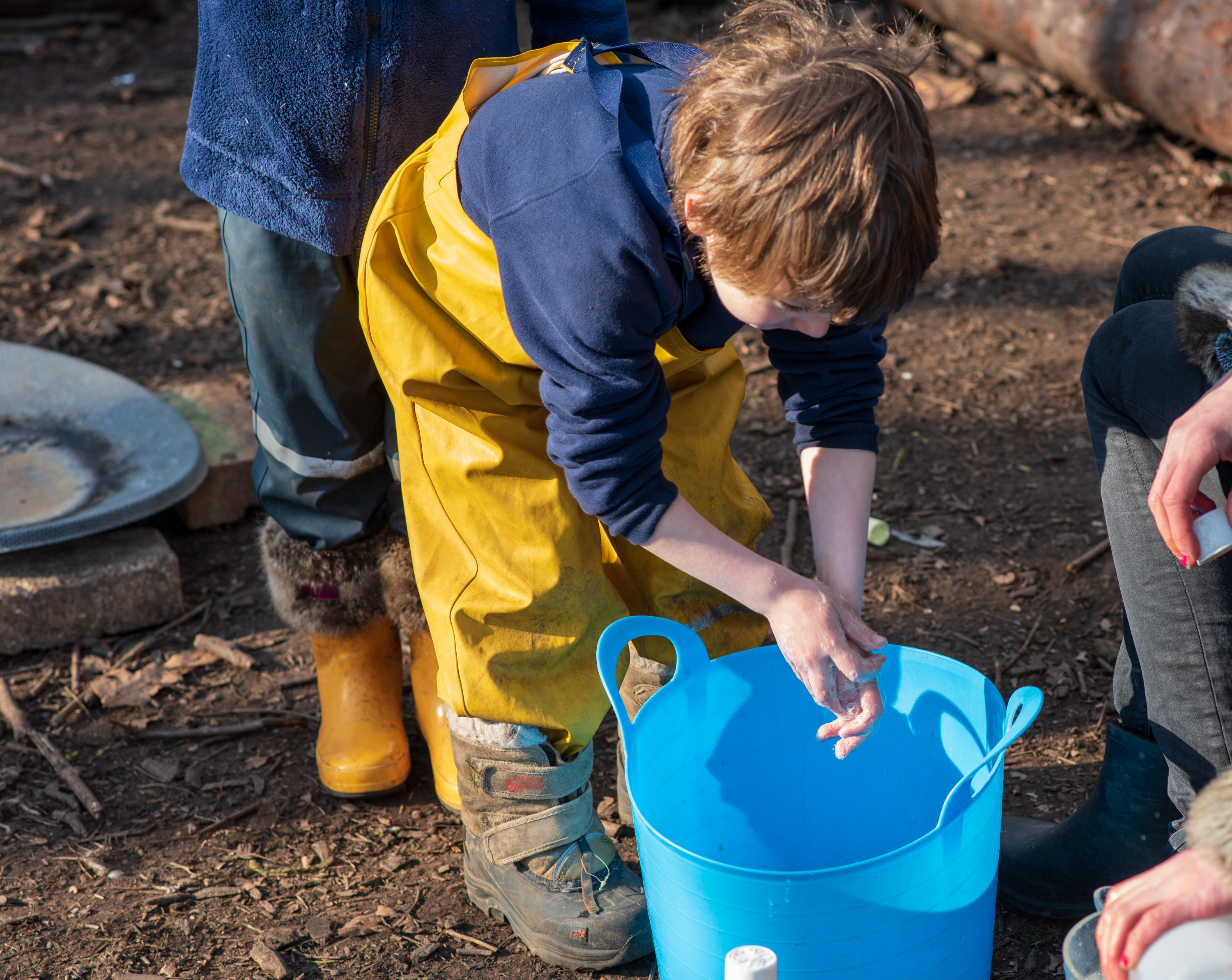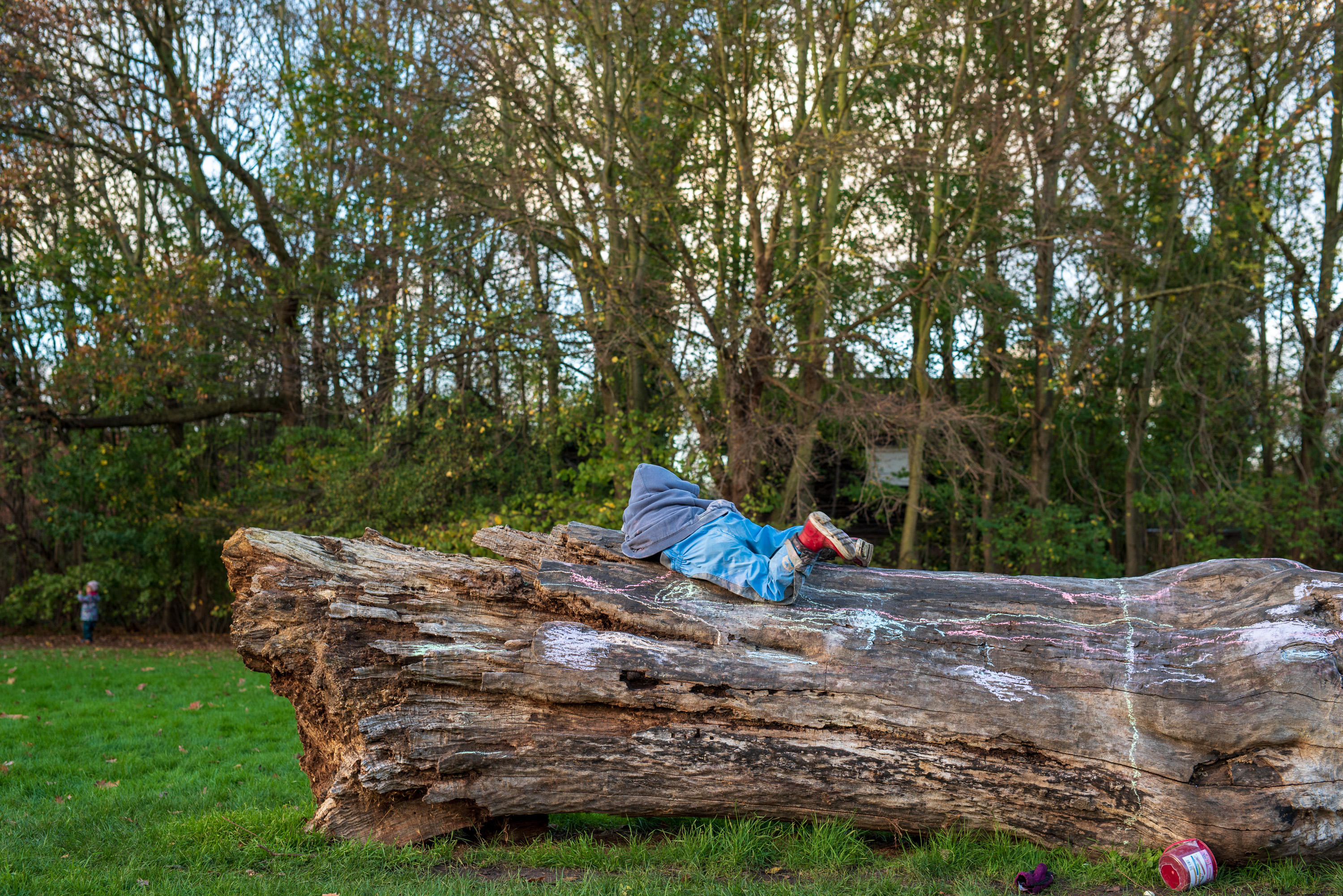Free Range Urban Kids
Photo ©Jørn Tomter / tomter.net
Text Michele Kirsch
Story first published in I Love Chatsworth Road magazine in 2016
A good ingredient for a happy life is a happy childhood. If children spend time outdoors come rain and shine, get bruises and climb trees they are halfway there.
 On a bitterly cold
and frosty January morning, I walk over the wet grass in Millfields Park, and
amidst the run-in-all-weathers iPodded joggers, and the rictus grin frozen dog
walkers, I spy a group of children happily huddled round a tree. Tiny children,
two or three years old, most wearing all-in-one snowsuits. Clearly they know
something I don’t, as they seem oblivious to the cold and are entranced by the
tree. There are nearly as many adults as there are children, and they too, seem
undaunted by the grey sky and potential for rain.
On a bitterly cold
and frosty January morning, I walk over the wet grass in Millfields Park, and
amidst the run-in-all-weathers iPodded joggers, and the rictus grin frozen dog
walkers, I spy a group of children happily huddled round a tree. Tiny children,
two or three years old, most wearing all-in-one snowsuits. Clearly they know
something I don’t, as they seem oblivious to the cold and are entranced by the
tree. There are nearly as many adults as there are children, and they too, seem
undaunted by the grey sky and potential for rain.
Welcome to the all-weather, child-led, playful world of Free Range Urban Kids (FRUK), a well-supervised but child-centric outdoor Hackney playscheme based on the ‘forest school’ learning style. For those not in the know, forest schools are an outdoor, education-based movement with roots in Scandinavia, (think snow, cold, woodlands) which starting making headway in the UK in the mid-90s. If the thought of letting your toddler out (or indeed, accompanying them) to ramble and roam in the wilds of Millfields Park, Walthamstow Marshes or Lea Valley makes you shiver, I hear you. My children grew up in Hackney and when the temperature dropped below freezing, so would we. Sure, it might be easier to invite a kid over for a ‘playdate’, stick ‘em in a room full of toys and a flat screen telly while you and other parents drink vats of tea and intervene only when one has got the other in a headlock over whether they are going to watch Peppa Pig or In the Night Garden, but it’s time to rethink how city kids play.

Of course, there are studies that beat you to it. Play England, an organisation that campaigns for better play access for all UK children, ran a survey a few years back that found 50% of children are not allowed to climb trees and 21% are forbidden to play conkers. But 70% of the adults surveyed said their happiest childhood memories involved playing outdoors with their mates. Yes, OK, there are new concerns about Health and Safety but get this: Cath Pringle, co-founder of Play England has said herself that the best way to learn about risk is to experience it. She has said, “If a child risks climbing a tree, then they might risk reading aloud.” Her point being, if kids take calculated risks early on in life, they are more likely to go for it in more formal education later on.

This is an ethos that Free Range Urban Kids co-founders Hayley Mitchell and Lizzy Hassay embrace fully. Though the group I observe are a little young to climb trees just yet, they say that once they are ready to climb, they let them go for it, though they might need help on the way down. In the meantime, teacher Henry shows the group some newly planted fruit trees, and the children whoop in delight at the thought of all the fruit they will bear when the time is right. The children are incredibly articulate and vocal for ones so young, giving opinions on their favourite fruit, when the fruit might come, what part of the tree it might come from, and so on. They run from tree to tree to keep warm, and if they fall over, they dust themselves down (or not) and carry on. No tears, no tantrums. I feel as if I’ve landed on another planet, where the kids, quite frankly, don’t act like babies but rough and tumble, tough little chaps and gals, not complaining about the cold, but happily and safely burning off all that toddler energy. Lizzy points out that since its inception about 18 months ago, there has only been one day of rain and what was interesting to see was the marked difference in the way the kids reacted and the parents did. The latter all ran for cover in a small shelter made of sticks and waterproof sheeting. “But the kids ran about in the rain, and the shelter created a little waterfall on the sides, it was raining so hard, and the kids were running in and out of it and having great fun.”
 It truly is an
example of letting nature be thy teacher, and the child being “father” of the
man. But Hayley is keen not to make comparisons with indoor based playgroups,
explaining, “We are not in competition, it’s just that we have all these
wonderful resources here on our doorstep.”
It truly is an
example of letting nature be thy teacher, and the child being “father” of the
man. But Hayley is keen not to make comparisons with indoor based playgroups,
explaining, “We are not in competition, it’s just that we have all these
wonderful resources here on our doorstep.”
That said, two of the play leaders are fully qualified primary school teachers, and they do know the boxes they have to tick in order to be recognised as an official pre-school programme. If this happens, FRUK can realise its vision of becoming a five day a week operation, as it is now running two days a week to full capacity.

Still, it must be difficult for kids who think ‘school’ is a great, fun place where you can run wild and free and learn stuff at the same time, to go into formal education and sit at desks for large stretches of the day, learning from books. Primary school teacher and FRUK playleader Yvette Cheever, who can see both sides of the story, feels that forest school ethics are better for those children who don’t feel good being categorised into groups of performance related tasks.

“Personally, I found the ability grouping of the school system limits the potential of children who are deemed to be ‘less able’. The open ended structure of the forest is limitless. Nature provides an level playing field and equal opportunities for everyone. The environment allows development at all levels and through self-led play and discovery, and the chance to collaborate and create where the conventional classroom setting does not lend itself. The ‘doing’ nature of forest school means that children also have very tangible experiences to draw upon for the traditional subjects. Numeracy and literacy can be developed in this way, through observation, communication and construction.”

It’s also abundantly clear from the short session I observe that these children are confident, happy, and have a good sense of themselves and the world around them.

The health benefits of being in the outdoors are unquestionable and highly evidenced. The open space allows for appreciation and awe from the smallest to the largest details. The children can carry this attitude on through to formal education, if it not suppressed by well-meaning but frustrated teachers forced by the system to ‘teach to the test’. Plus, with all that space to run around and burn off that natural kid energy, there seem to be fewer of the sorts of arguments that break out in more conventional indoor play settings.

One thing clear about FRUK is that there are no man made toys, therefore no rows about sharing (a concept which very young children find hard to grasp anyway). The children are given little baskets to collect “treasure” and in the park there is treasure aplenty in form of grass, twigs, mud, and stones. Hayley explains, “There is enough and more for everyone, and there is so much space. The children can run about and they learn in a holistic way, about how the wind feels, what trees and grass smell like, what they feel like, and the ‘toys’ are what they find and what they want them to be, so a stick can be a wand, for example, and there are plenty of sticks.”

They also learn how to be in touch with the seasons, what happens outdoors as the seasons change, what grows and when. Of course they can learn all this from books, but I have watched children in small circles sit on their bums in overheated classrooms talking about what fun there is to be had outdoors. Kids want to move, and FRUK works with that kid energy instead of trying to suppress it.

There are other benefits to playing outdoors. Studies show that children who spend more time playing outdoors get ill less often than kids who play indoors, have fewer allergies and are less stressed. Hayley says, “We let them get muddy, it’s part of being outside.”
 It’s clear when the
session is winding down and the children huddle under the shelter for warming
soup and fruit snacks and listen to a story, that they are happily tired
without actually being zoned out. They wash their hands, sit on sack-covered
logs and listen intently to a story about an animal who loves to eat
dandelions, until there is a dandelion shortage and he can’t even get them
online.
It’s clear when the
session is winding down and the children huddle under the shelter for warming
soup and fruit snacks and listen to a story, that they are happily tired
without actually being zoned out. They wash their hands, sit on sack-covered
logs and listen intently to a story about an animal who loves to eat
dandelions, until there is a dandelion shortage and he can’t even get them
online.
 Though happy and calm
adults make for happy and calm children, the opposite is also true. Being
around happy children absorbed in wonder at the world around them is a big high
for grown ups.
Though happy and calm
adults make for happy and calm children, the opposite is also true. Being
around happy children absorbed in wonder at the world around them is a big high
for grown ups.
It’s true and it’s infectious. When the children spot a long worm poking its head and emerging slowly, fully from the mud, the kids are enraptured, a proper mini beast coming out to say hello. Even I find myself a little excited, and I don’t even like worms, or the cold, or getting my shoes stuck in the mud. When I leave the session, I felt strangely uplifted, to know there is an alternative to that soupy, disinfectant smell of an indoor playgroup.
 FRUK founders Lizzy Hassay and Hayley Mitchell
FRUK founders Lizzy Hassay and Hayley MitchellWebsite:
Free Range Urban Kids

